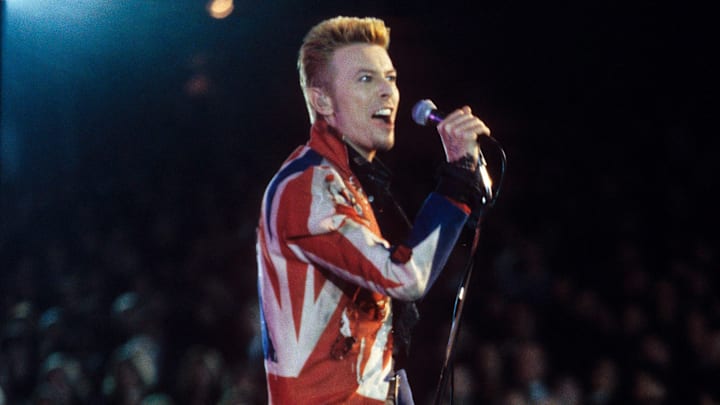The imagery of David Bowie's album covers are as much a part of the art as the music. And just as his songs have layers of meaning to dissect, so do the cover images. One of these covers is the Earthling album which shows Bowie in a Union Jack coat, what was the real meaning behind this cover?
Famously, his final album, Blackstar, was so packed with arcane meaning, both in the music and the packaging, that fans were still finding secrets years later. Even comparatively simple cover images, such as the cover of 1997’s Earthling album, can be pored over by fans looking for meaning. At the center of that cover image is Bowie with his back to the camera, showing off a frock coat designed by Alexander McQueen, emblazoned with the Union Jack.
Ever since the British rock ‘n’ roll invasion of the 60s, the symbolism of the British empire in pop culture has been in flux. In the 60s, the Union Jack symbolized confidence and was simply a sign that the pop culture icons who wore it were British. But as the optimism of the 60s curdled into the darkness of the 70s, the flag started being worn with pointed irony by punks who saw it as a symbol of oppression. As with all patriotic symbols, it was coopted by white supremacists to show pride in England’s colonial conquests, vindicating the punks’ ironic use. And around the same time, the Britpop movement, which saw itself as a reboot of the British invasion, used the Union Jack to harken back to the simpler times of cool Britannia.
Bowie lived through all those periods, starting at the tail end of the British Invasion. He survived punk, very much typified cool Brittania, and was worshipped by the Britpoppers. He was even accused of having fascist sympathies after an unfortunate coke-fueled rant (Bowie’s fascist sympathies were a persistent rumor right up to the very end, though fans from my end of the world know this not to be true.) So which of these meanings was the Union Jack coat referencing? All of them?
Bowie commissioned the coat in 1996 while he was touring on tour with Nine Inch Nails, perhaps intending it as a stately old-world counterpoint to the brash young Americans he shared the stage with. Though if you look closely at the Earthling cover, you’ll see that the coat is tattered and dirty, like it’s been dragged through the mud (in fact, it was). Bowie poetically described this as “a retelling of the British flag joke, again torn and stained...the tatty remains of a metaphysical empire,” and according to Bowie’s guitarist and frequent co-writer Reeves Gabrel, Bowie wanted to realign himself with England.
So it referenced Bowie’s undeniable English heritage and political comment on the declining empire? Seems so...
Bowie's Union Jack coat meaning was also a personal and cheery statement
From 1986 to 2016, Neil Young organized an annual benefit for the Bridge School, a school for special needs children, founded by his wife Pegi after their son was diagnosed with cerebral palsy. In 1996 Bowie played the benefit, along with Pearl Jam, Patti Smith, the Cowboy Junkies…
...and Pete Townshend.
Bowie was jovial, joking with the audience. At one point, he announced, “This is one I wrote a long, long time ago,” before playing the first few chords of The Who’s "Anyway Anyhow Anywhere," then saying, “Oh, I’ve got Pete Townshend’s songbook here, sorry. Could have been mine.”
He then went on, “You don’t know what a big influence Pete and the boys were on us next generation acts. We just idolized that guy. I even got a jacket made like his. It took me thirty years, but I eventually got one made just like his.”

Fashion icon David Bowie, one of the most influential musicians of the 20th century, just wanted to dress like his musical idol. Sometimes it pays not to overanalyze these things.
